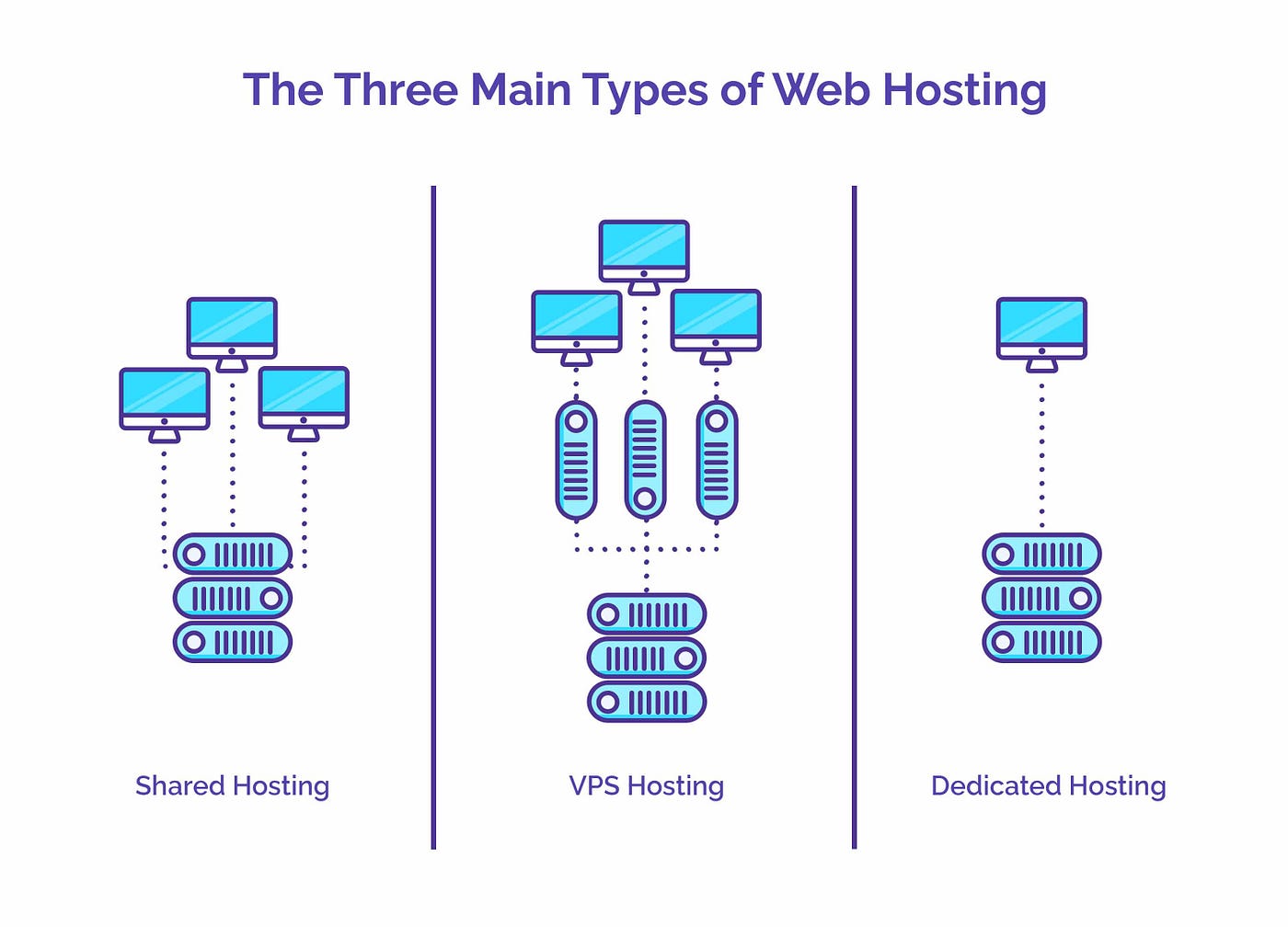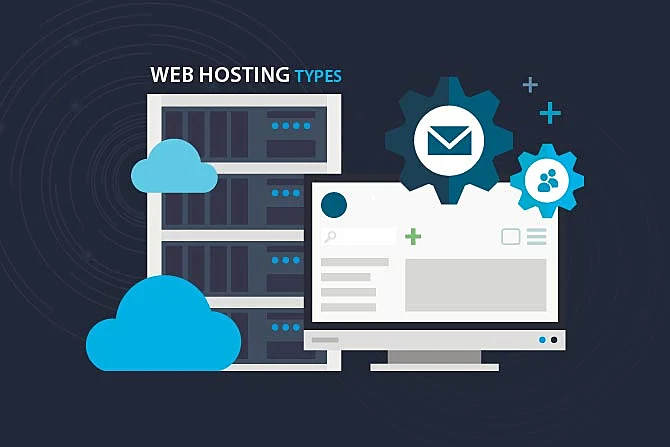Web host In today’s digital age, having a strong online presence is essential for businesses and individuals alike. Whether you’re launching a blog, an e-commerce store, or a portfolio website, choosing the right web hosting provider is crucial. In this comprehensive guide, we’ll delve into the world of web hosting, exploring different types, factors to consider when choosing a provider, popular hosting companies, and tips for optimizing website performance.
Introduction to Web Hosting
Web hosting is a service that allows individuals and organizations to make their websites accessible via the World Wide Web. Essentially, web hosting providers allocate space on servers, which are stored in data centers, to host websites. When users type in a website’s domain name, their browser connects to the server where the website is hosted, allowing them to access its content.
Types of Web Hosting

Shared Hosting
Shared hosting is the most common type of hosting and is suitable for small to medium-sized websites. With shared hosting, multiple websites share resources on a single server, making it an affordable option. However, since resources are shared, performance may be impacted if other websites on the same server experience high traffic.
Virtual Private Server (VPS) Hosting
VPS hosting provides users with dedicated resources on a virtual server within a larger physical server. This offers greater control and flexibility compared to shared hosting. Each VPS operates independently, allowing users to customize their server environment to suit their specific needs.
Dedicated Server Hosting
Dedicated server hosting provides users with exclusive access to an entire server. This option is ideal for websites with high traffic volume or resource-intensive applications. With dedicated server hosting, users have full control over server configuration and can optimize performance to meet their requirements.
Cloud Hosting
Cloud hosting utilizes a network of virtual servers to host websites, rather than relying on a single physical server. This distributed infrastructure offers scalability and reliability, as resources can be dynamically allocated based on demand. Cloud hosting is particularly well-suited for websites with fluctuating traffic levels.
Factors to Consider When Choosing a Web Host
When selecting a web hosting provider, several factors should be taken into consideration:
Performance and Reliability
A reliable web host should offer excellent uptime and fast server response times to ensure that your website is always accessible to visitors.
Pricing
Consider your budget and compare pricing plans offered by different hosting providers. Be sure to factor in any additional costs, such as domain registration fees and renewal prices.
Scalability
Choose a web host that can accommodate your website’s growth. Look for providers that offer scalable hosting plans and easy upgrades.
Customer Support
Quality customer support is essential, especially if you’re new to web hosting. Ensure that the provider offers responsive support channels, such as live chat, email, and phone support.
Security Features
Protecting your website from cyber threats is paramount. Choose a web host that offers robust security measures, such as firewalls, malware scanning, and SSL certificates.
Popular Web Hosting Providers

There are countless web hosting providers available, but some of the most popular ones include:
- Bluehost: Known for its reliability and affordability, Bluehost offers a range of hosting plans suitable for beginners and advanced users alike.
- HostGator: With its user-friendly interface and 24/7 customer support, HostGator is a popular choice for hosting websites of all sizes.
- SiteGround: SiteGround is renowned for its exceptional performance and top-notch customer service, making it a favorite among web developers and businesses.
- DreamHost: DreamHost stands out for its commitment to privacy and transparency, offering a range of hosting solutions tailored to different needs.
How to Set Up a Website with a Web Host
Setting up a website with a web host is relatively straightforward:
- Registering a Domain Name: Choose a unique domain name that reflects your brand or website content. Many hosting providers offer domain registration services.
- Choosing a Hosting Plan: Select a hosting plan that aligns with your website’s needs and budget. Consider factors such as disk space, bandwidth, and scalability.
- Setting up the Website: Once you’ve purchased a hosting plan, follow the provider’s instructions to set up your website. This typically involves installing a content management system (CMS) like WordPress and uploading your website files.
Tips for Optimizing Website Performance with Web Hosting
To ensure optimal performance and user experience, consider implementing the following optimization techniques:
- Content Delivery Network (CDN): Utilize a CDN to distribute your website’s content across multiple servers worldwide, reducing latency and speeding up page load times.
- Caching: Enable caching mechanisms to store frequently accessed website data, reducing server load and improving response times.
- Regular Backups: Schedule regular backups of your website’s files and databases to safeguard against data loss in the event of a server failure or security breach.
Web hosting is essentially the service that makes your website accessible on the internet. When you create a website, you’re essentially creating a collection of files (HTML, CSS, images, etc.) that need to be stored somewhere so that people can access them. That’s where web hosting comes in. Web hosts provide servers—powerful computers specially designed to store websites—that allow your site to be seen by others on the internet.
Types of Web Hosting
There are several types of web hosting available, each with its own advantages and disadvantages:
Shared Hosting
Shared hosting is the most common and affordable type of hosting. With shared hosting, your website shares server resources with other websites. While this can make it a cost-effective option, it also means that your site’s performance may be affected by the activities of other sites on the same server.
Virtual Private Server (VPS) Hosting
VPS hosting offers more control and flexibility compared to shared hosting. With VPS hosting, your website is hosted on a virtual server within a larger physical server. This gives you dedicated resources and greater stability, making it a popular choice for medium-sized businesses and high-traffic websites.
Dedicated Server Hosting
Dedicated server hosting provides you with an entire physical server dedicated solely to your website. This gives you complete control over server resources and configurations, making it ideal for large businesses and mission-critical websites that require maximum performance and security.
Cloud Hosting
Cloud hosting is a scalable and flexible hosting solution that utilizes a network of servers to host websites. With cloud hosting, your website is not tied to a single physical server. Instead, it is hosted on a virtual server that draws resources from a vast network of interconnected servers. This ensures high availability and uptime, making it suitable for websites with unpredictable traffic patterns.
Factors to Consider When Choosing a Web Host
When selecting a web hosting provider, there are several factors you should consider:
Performance and Reliability
Your web host should offer reliable uptime and fast server response times to ensure that your website is always accessible to visitors. Look for hosts with a proven track record of reliability and performance.
Pricing
Consider your budget and compare pricing plans from different hosting providers. Keep in mind that cheaper isn’t always better—look for a hosting plan that offers good value for your money and includes essential features like security and support.
Scalability
Choose a web host that can scale with your business as it grows. Look for hosts that offer flexible hosting plans and easy upgrade options so that you can accommodate increases in traffic and demand without experiencing downtime or performance issues.
Customer Support
Good customer support is essential, especially if you’re new to web hosting or encounter technical issues with your website. Look for hosts that offer 24/7 support via multiple channels, including phone, email, and live chat.
Security Features
Security is paramount when it comes to web hosting. Look for hosts that offer robust security features, such as SSL certificates, firewalls, malware scanning, and regular backups, to protect your website and data from cyber threats and attacks.
Popular Web Hosting Providers

There are countless web hosting providers to choose from, but some of the most popular and reputable ones include:
Bluehost
Bluehost is one of the largest and most trusted web hosting companies in the world. It offers a range of hosting plans to suit different needs and budgets, along with excellent uptime, performance, and customer support.
HostGator
HostGator is known for its affordable hosting plans, user-friendly interface, and reliable performance. It offers a variety of hosting options, including shared, VPS, and dedicated hosting, along with 24/7 customer support.
SiteGround
SiteGround is renowned for its exceptional performance, security, and customer service. It offers managed hosting solutions with advanced features like automatic updates, daily backups, and free SSL certificates.
DreamHost
DreamHost is a reliable and affordable web hosting provider that offers a range of hosting plans tailored to different needs. It’s known for its commitment to privacy and transparency, along with its user-friendly interface and excellent customer support.
Conclusion
Choosing the right web hosting provider is crucial for the success of your website. By understanding the different types of hosting, evaluating key factors like performance, pricing, and support, and considering reputable providers like Bluehost, HostGator, SiteGround, and DreamHost, you can ensure that your website is secure, reliable, and accessible to visitors.
FAQs
- How do I know which web hosting plan is right for my website?
- Consider factors such as your website’s traffic volume, resource requirements, and budget when selecting a hosting plan. Start with a plan that meets your current needs and allows for scalability as your website grows.
- What is uptime, and why is it important?
- Uptime refers to the percentage of time that a server is operational and accessible to users. High uptime ensures that your website is available to visitors consistently, minimizing downtime and potential revenue loss.
- Do I need technical expertise to set up a website with a web host?
- While basic technical knowledge can be helpful, many web hosting providers offer user-friendly interfaces and one-click installation options, making it easy for beginners to set up a website without extensive technical expertise.
- Can I switch web hosting providers after launching my website?
- Yes, it’s possible to migrate your website to a different hosting provider if you’re unhappy with your current service. However, the process can be complex and may involve downtime, so it’s essential to plan the migration carefully and follow best practices.
- What security measures should I look for in a web hosting provider?
- Look for hosting providers that offer features such as SSL certificates, regular malware scanning, firewalls, and automatic backups to protect your website from cyber threats and data loss.
